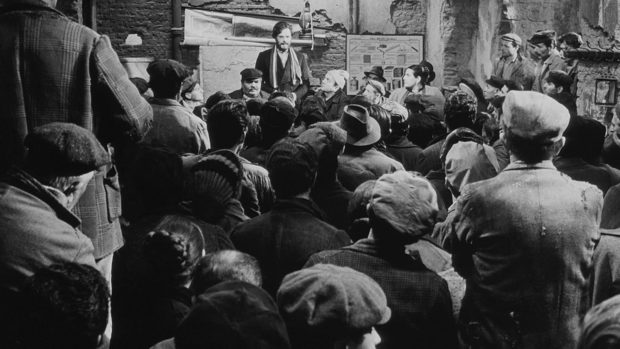 Mario Monicelli’s 1963 comedy/drama about a strike by factory workers in 19th century Turin is not as well known as it should be.
Mario Monicelli’s 1963 comedy/drama about a strike by factory workers in 19th century Turin is not as well known as it should be.
The other day I stumbled on a hidden gem, as I sometimes do in my restless curiosity about worthwhile films that are not so well known. From Italian director Mario Monicelli, released in 1963, it’s called The Organizer.
The setting is the northern Italian city of Turin in the late 19th century, when the industrial revolution had already drastically altered the lives of the common people. As the film opens, a teenage boy is roused from sleep to return to his work at the local textile factory. In a tour de force sequence revealing with very few words the plight of the factory laborers, the roaming camera shows us the steam-powered machinery operated by scores of grimy and exhausted men and women, working within an atmosphere of constant noise and movement. When a worker gets his hand mangled in a weaving machine, the bravest men in the factory decide to confront the owners and managers, to reduce their 14-hour work day and provide better safety.
The chief agitators are the melancholy, thoughtful Martinetti (Bernard Blier); the blustering, comic strong man Pautasso (Floco Lulli), and a brutishly handsome womanizer named Raoul, skeptical of their chances to make change, played by the great character actor Renalto Salvatori. And, just as Raoul fears, the wealthy factory owner brushes aside their modest demands with contempt, while punishing Pautosso for his role in an abortive work stoppage.
It’s a full half hour into the film, during which we’ve met these and quite a few other memorable characters, before we meet the title character, “the organizer,” a ragged, eccentric, perpetually hungry high school teacher who calls himself Professor Sinigaglia, played by the magnificent Marcello Mastroianni. Running from the police in his former town, the Professor wanders into Turin looking for some temporary shelter. But when he accidentally encounters a workers’ strategy meeting, he electrifies the audience with an impassioned speech, and ends up becoming the lead organizer of a general strike.
Mastroianni’s performance creates an impression both humorous and lovable in his shabby clothes and a pair of glasses that keep falling off, while his character demonstrates tremendous bravery in the face of the owner’s attempts to have the strike put down. All the while we see him casting longing glances at food that he is too poor to buy and too timid to steal.
I was only familiar with the director Monicelli from his 1958 film Big Deal on Madonna Street, the original prototype for the comic heist genre, which I’ve reviewed before on Flicks. I liked that movie a lot, but this one is a greater work altogether—impeccably cast and directed, with vivid characters; full of life, humor, and sadness; The Organizer instantly became one of my favorites. It’s not so well known because films about labor unions and strikes are generally not well loved by distributors. The original title in Italian was I Compagni, in other words Comrades, but in America they renamed it The Organizer because of the stigma around the word “Comrades,” which was associated in the popular mind with Communism.
This is, in my opinion, the best movie about work and workers’ rights ever made, but don’t think that means it’s dry or dull. Monicelli doesn’t take his characters too seriously, because they don’t either. They’re simple, humble, flawed but courageous human beings, and The Organizer is a delight, and profoundly moving as well. It’s available on DVD.

In the late 19th century, a Danish Lutheran priest is sent to Iceland to build a church, but the overwhelming power of nature threatens...

An alcoholic contemplates suicide in Louis Malle’s devastating 1963 film about the human desire for meaning. Louis Malle was a director of astonishing range....

The two most famous film versions of Victor Hugo’s novel featured Lon Chaney in 1923, and Charles Laughton in 1939. In 1831, Victor Hugo...